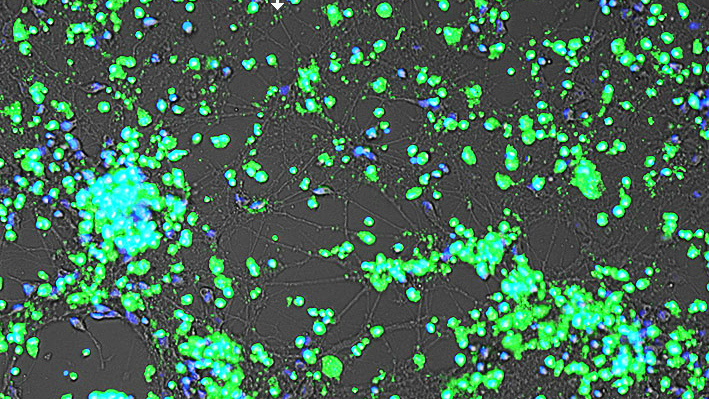Dr Jody Mason has been awarded an Alzheimer’s Research UK Major Project Grant to look for small compounds called peptides which might be able to prevent the build-up of toxic proteins in the brain linked to Parkinson’s disease and related dementias.
Dr Mason, from the Department of Biology & Biochemistry, has been awarded £332,000 over three years to identify peptides which can halt the build-up of so-called Lewy bodies. These are toxic clumps of proteins within dopamine-producing cells, which interfere with normal brain function.
The research team, working alongside Dr Rob Williams’ group, will sift through vast mixtures of peptides, short chains of amino acids, within living cells. This will identify which stop Lewy bodies from forming by sticking to a key protein and most importantly detoxifying it.
By characterising the function of any promising peptides, and testing them inside brain cells for safety and efficacy, the team hope to eventually identify peptides which could become new therapeutic drugs. The award is highly interdisciplinary, involving collaborators at the University of Queensland in Australia with considerable expertise towards turning peptide-based compounds into drugs.
Dr Mason said: “We are very grateful for Alzheimer’s Research UK recognising our work and for funding the project. Toxic neuronal inclusions known as Lewy bodies are key causative agents in Parkinson’s disease pathology. We will now study how cell death and clumping are linked and therefore how toxicity can be prevented using our cell-derived peptides, offering the possibility to develop pre-clinical drug leads or diagnostics towards a Parkinson’s treatment.”
Dr Rob Williams added: “There is an urgent need for treatments to halt the progression of Parkinson’s disease and Dementia with Lewy Bodies and these peptides offer a new therapeutic approach to tackle the problem.”
Dr Sara Imarisio, Head of Research at Alzheimer’s Research UK said: “There are 850,000 people living with dementia in the UK, including 87,000 people in the South West, and as we are all living longer, this number is set to rise. While age is a big risk factor for dementia, it is not a normal part of ageing. Dementia is the result of physical changes to the brain caused by diseases like Alzheimer’s. Understanding the complex process that contribute to the development of Alzheimer’s disease is crucial in the hunt for new treatments.
“We are delighted to support pioneering research projects in Bath. Alzheimer’s Research UK receives no government funding for the research we support and it is only thanks to the generosity of our supporters that we’re able to fund vital dementia research.”
The research grant will support a postdoctoral researcher in Dr Mason’s group and Research Technician in Dr William’s group for the duration of the study. Dr Mason’s lab is also investigating how peptides might be used to combat certain kinds of cancers.

